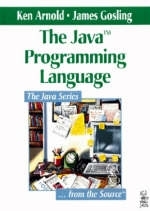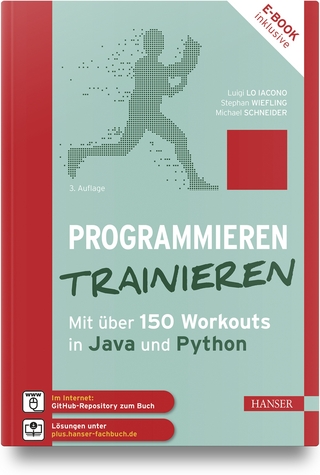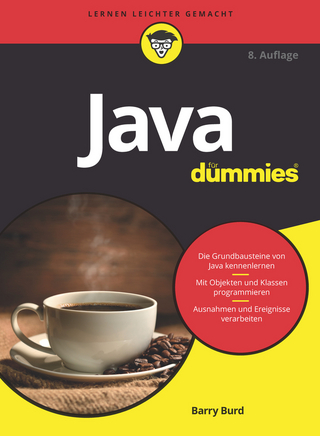
The Java™ Programming Language
Addison Wesley (Verlag)
978-0-201-63455-6 (ISBN)
- Titel ist leider vergriffen;
keine Neuauflage - Artikel merken
Third Edition now available!Coauthored by the creator of the Java technology, The Java Programming Language is the definitive resource for all serious Java programmers. This book will give you a solid foundation in Java programming language strategies and techniques. It features a concise introduction to the language and detailed descriptions of Java's commands, constructs, and libraries, and includes numerous real-world examples that show you how to exploit the language's power, portability, and flexibility. You will find in-depth and progressively advanced coverage of classes and objects, interfaces, exception-handling, threads and multitasking, and packages. In addition, the book describes the Java core library packages, including I/O, standard utilities, language types, and system classes. The book lets you in on the rationale behind Java's design, direct from the language's creator, as well as the tradeoffs involved in using specific features. With these insights, you will have the understanding you need to begin developing Java applications and applets. 0201634554B04062001
Ken Arnold, formerly senior engineer at Sun Microsystems Laboratories, is a leading expert in object-oriented design and implementation. He was one of the original architects of the Jini™ technology, and the lead engineer of Sun's JavaSpaces™ technology. James Gosling is a Fellow and Chief Technology Officer of Sun's Developer Products group, the creator of the Java programming language, and one of the computer industry's most noted programmers. He is the 1996 recipient of Software Development's "Programming Excellence Award." He previously developed NeWS, Sun's network-extensible window system, and was a principal in the Andrew project at Carnegie Mellon University, where he earned a Ph.D. in computer science.
Preface.
1. A Quick Tour of Java.
Getting Started.
Variables.
Comments in Code.
Named Constants.
Flow of Control.
Classes and Objects.
Methods and Parameters.
Arrays.
String Objects.
Extending a Class.
Interfaces.
Exceptions.
Packages.
The Java Infrastructure.
Other Topics Briefly Noted.
2. Classes and Objects.
A Simple Class.
Fields.
Access Control and Inheritance.
Creating Objects.
Constructors.
Methods.
this.
Overloading Methods.
Static Members.
Garbage Collection and finalize.
main.
The toString Method.
native Methods.
3. Extending Classes.
An Extended Class.
What protected Really Means.
Constructors in Extended Classes.
Overriding Methods and Hiding Fields.
Marking Methods and Classes final.
The Object Class.
Abstract Classes and Methods.
Cloning Object.
Extending Classes: How and When.
Designing a Class to be Extended.
4. Interfaces.
An Example Interface.
Single Inheritance versus Multiple Inheritance.
Extending Interfaces.
Implementing Interfaces.
Using an Implementation.
When to Use Interfaces.
5. Tokens, Operators, and Expressions.
Character Set.
Comments.
Tokens.
Identifiers.
Primitive Types.
Literals.
Declarations of Variables.
Array Variables.
Initial Values.
Operator Precedence and Associativity.
Order of Evaluation.
Expression Type.
Type Conversions.
Member Access.
Arithmetic Operators.
Increment and Decrement Operators.
Relational and Conditional Operators.
Bit Operators.
The Conditional Operator ?:.
Assignment Operators.
Package Names.
6. Control Flow.
Statements and Blocks.
if-else.
switch.
while and do-while.
for.
Labels.
break.
continue.
return.
What, No goto?
7. Exceptions.
Creating Exception Types.
throw.
The throws Clause.
try, catch, and finally.
When to Use Exceptions.
8. Strings.
Basic String Operations.
String Comparisons.
Utility Functions.
Making Related Strings.
String Conversions.
Strings and char Arrays.
Strings and byte Arrays.
The StringBuffer Class.
9. Threads.
Creating Threads.
Synchronization.
wait and notify.
Details of wait and notify.
Thread Scheduling.
Deadlocks.
Suspending Threads.
Interrupting Threads.
Ending Thread Execution.
Ending Application Execution.
Using Runnable.
volatile.
Thread Security and ThreadGroup.
Debugging Threads.
10. Packages.
Package Naming.
Package Access.
Package Contents.
11. The I/O Package.
Streams.
InputStream.
OutputStream.
Standard Stream Types.
Filter Streams.
PrintStream.
Buffered Streams.
ByteArray Streams.
StringBufferInputStream.
File Streams and FileDescriptor.
Piped Stream.
SequenceInputStream.
LineNumberInputStream.
PushbackInputStream.
StreamTokenizer.
Data Streams.
RandomAccessFile.
The File Class.
FilenameFilter.
The IOException Classes.
12. Standard Utilities.
BitSet.
Enumeration.
Implementing an Enumeration Interface.
Vector.
Stack.
Dictionary.
Hashtable.
Properties.
Observer/Observable.
Date.
Random.
StringTokenizer.
13. Programming with Types.
Class.
Loading Classes.
Wrapper Classes: An Overview.
Boolean.
Character.
Number.
Integer.
Long.
Float and Double.
14. System Programming.
Standard I/O Stream.
Memory Management.
System Properties.
Creating Processes.
Runtime.
Miscellaneous.
Security.
Math.
Appendix A: Native Methods.
Overview.
The C and C++ Mapping.
An Example: Internals for LockableFile.
Strings.
Arrays.
Creating Objects.
Invoking Methods.
A Final Caution.
Appendix B: Java Runtime Exceptions.
RuntimeException Classes.
Error Classes.
Appendix C: Useful Tables.
Bibliography.
Index. 0201634554T04062001
| Erscheint lt. Verlag | 13.6.1996 |
|---|---|
| Verlagsort | Boston |
| Sprache | englisch |
| Maße | 188 x 234 mm |
| Gewicht | 580 g |
| Themenwelt | Informatik ► Programmiersprachen / -werkzeuge ► Java |
| Mathematik / Informatik ► Informatik ► Web / Internet | |
| ISBN-10 | 0-201-63455-4 / 0201634554 |
| ISBN-13 | 978-0-201-63455-6 / 9780201634556 |
| Zustand | Neuware |
| Haben Sie eine Frage zum Produkt? |
aus dem Bereich


